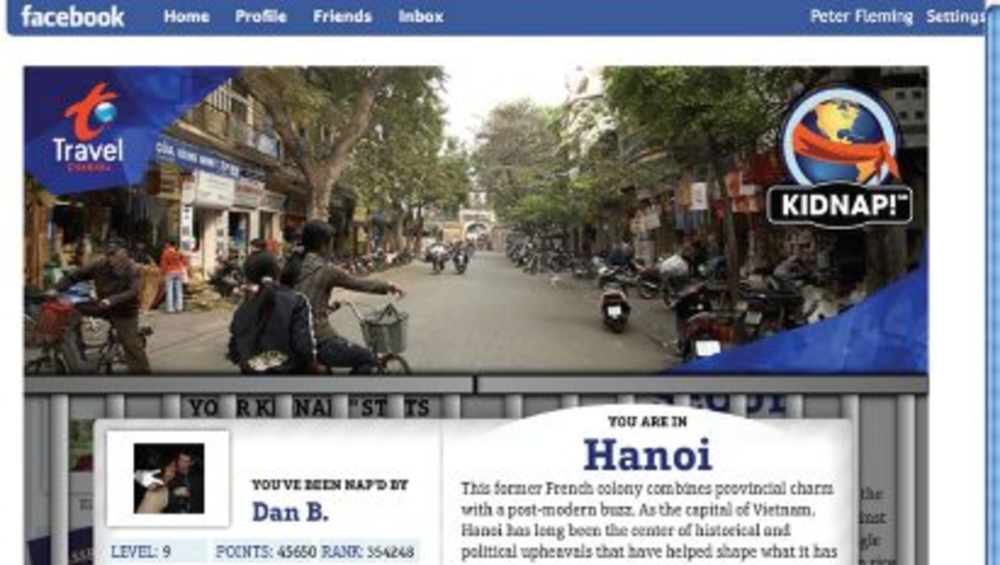For the Travel Channel, advertising on Facebook represented an opportunity to expand its audience. The goal was to drive traffic to the Travel Channel’s Web site and create an engaging way to connect with consumers and their friends in their social sphere.
Rather than run a banner ad that linked to the URL, the cable channel enlisted its direct agency Rapp to create a social media application called Kidnap. The game let consumers “kidnap” their friends and “hide” them in their favorite hideout city using a variety of methods. To escape and kidnap their own friends, kidnap victims were required to answer travel trivia questions, with a cheat sheet set up on TravelChannel.com for reference.
“We wanted to create a fun user experience so they didn’t think that they were being sold to,” says Patrick Lafferty, CMO of the Travel Channel.
The Travel Channel’s game led to an average of seven page views per person. Those kidnapped invariably visited the site seeking the cheat sheet which was located on one page. However, once there, users tended to click around on their own accord.
“The audience isn’t looking around for a brand to interact with — they are looking for entertainment,” says Whalen. “We provided an entertainment value and an educational value with the Kidnap game, and I think that’s what made it work so well.”
According to ComScore, Facebook is the fifth most visited site across the Internet with 92 million unique visits in August. This huge audience is a big draw to advertisers, but social network advertising remains a challenge. Applications may be one way to connect with consumers on Facebook effectively.
“When consumers are participating in Facebook, they are looking for experiences that provide value from an entertainment or a utility standpoint,” says Rich Whalen, VP and interactive strategist at Rapp. “Brands have to keep this in mind when they try to connect with consumers in the social space.”
Like the Travel Channel, several other brands are discovering that playful, interactive games help engage consumers on Facebook.
MomsLikeMe.com, a Gannett social network for moms, tested Facebook to build its user base.
“Facebook is right for us because women who are already engaged on social networks are our best bet,” says Lisa Tyler, director of digital product marketing of MomsLikeMe.com.
MomsLikeMe launched a national Facebook fan page on April 16 with a quiz called “What kind of mom are you?” It ran Facebook engagement ads and banner ads for six weeks to drive people to the fan page. During that time, the national fan base hit 12,000. It currently has about 16,000 members. The quiz also took off virally.
“We have seen a lot of viral growth from it,” says Tyler. “More than 113,000 people have taken the quiz, but only 34,000 of those were taken from the ad, which really speaks to the viral aspect. Social media is great for this kind of viral communication.”
Monetizing consumer interactions is still a challenge, but that is not always the goal of social media marketing.
“Travel Channel’s game is more a promotion, rather than a way to generate revenue,” said Debbie Williamson, a senior analyst at eMarketer.
“The application doesn’t need to be monetized because it serves a specific purpose. It’s meant to have them associate Travel Channel as a hip, interactive place,” she adds. “They want to appeal to the user base of Facebook and get them to go to the Travel Channel.”
Williamson says many marketers “use Facebook for brand awareness, engagement and loyalty.” She says it is not that nobody is monetizing social media. Rather, the issue is just that very few are monetizing it.
“The goal is to get people to think about a brand because of their interactions on Facebook.”
The New England Patriots have also found that a fun application can be a powerful way to connect with fans. The NFL franchise worked with technology firm Buddy Media to create an application called Facebook Fanzone that lets football fans connect and make predictions about upcoming games. There is also a trivia component.
“We are trying to give people a way to connect with us and have fun doing it,” says Fred Kirsch, director of interactive media for the Patriots.
The application, which launched in September, targets 18- to 55-year-old men. The Patriots used Twitter and promoted it around their Facebook community through status updates to get the word out. Users can also share the applications with their friends through Facebook. So far, the team has more than 165,000 Facebook fans.
The Patriots have not yet used any Facebook display ads, though they are considering doing this to increase awareness.







